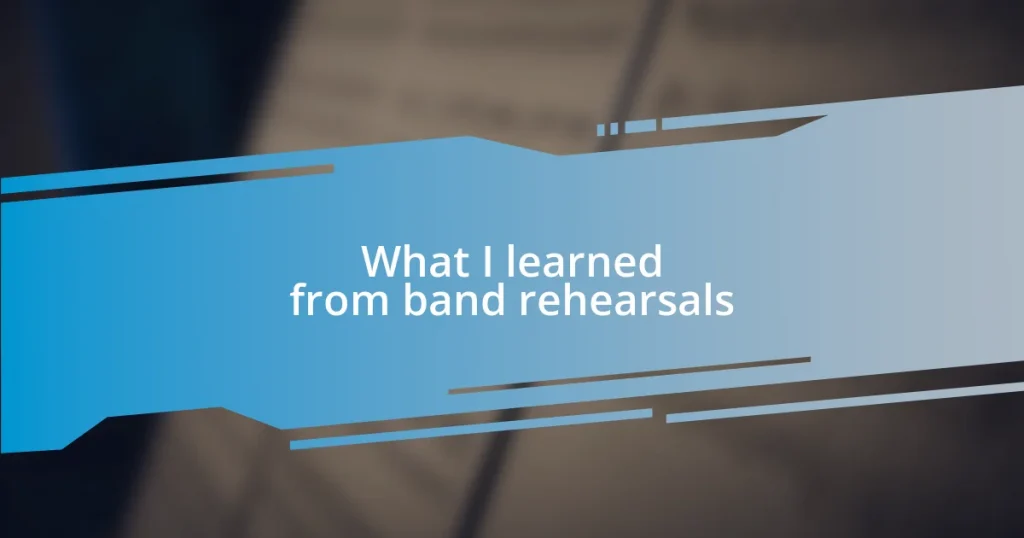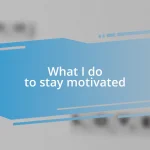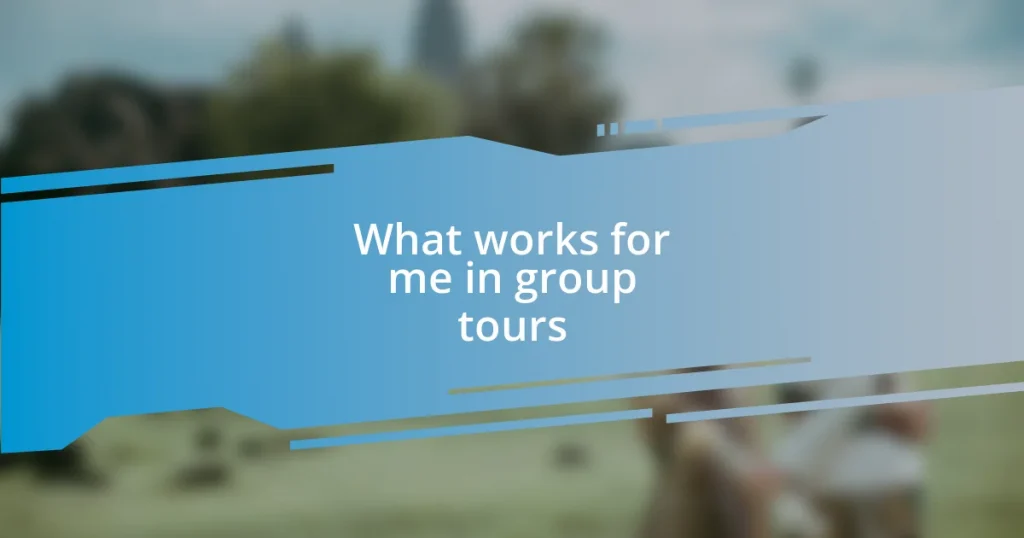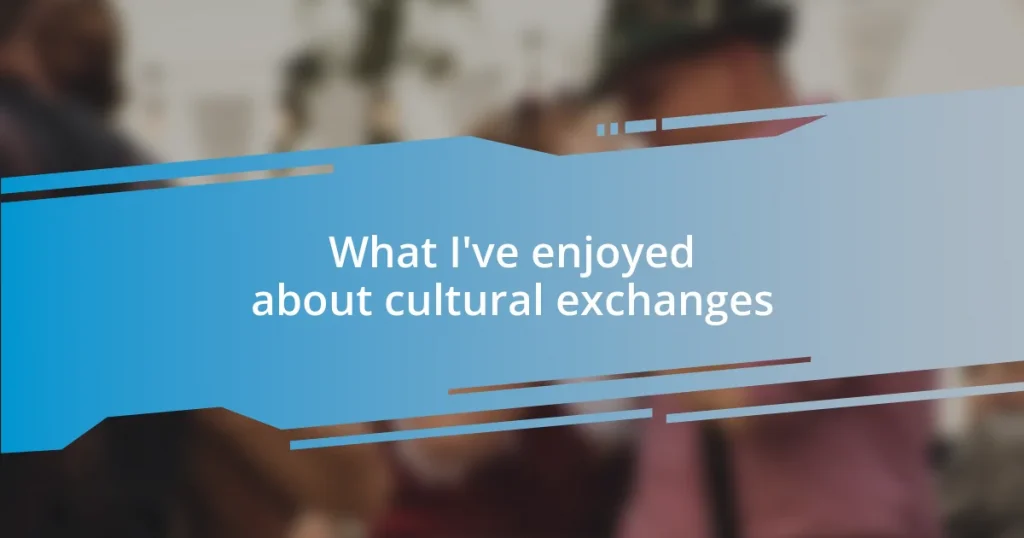Key takeaways:
- Band rehearsals foster teamwork, adaptability, and active communication, enhancing both musical and personal connections among members.
- Effective strategies, such as setting clear goals and embracing vulnerability, improve collaboration and build trust within the group.
- Lessons learned in rehearsals, including flexibility and emotional connection, can be directly applied to performances, creating more engaging and impactful experiences.
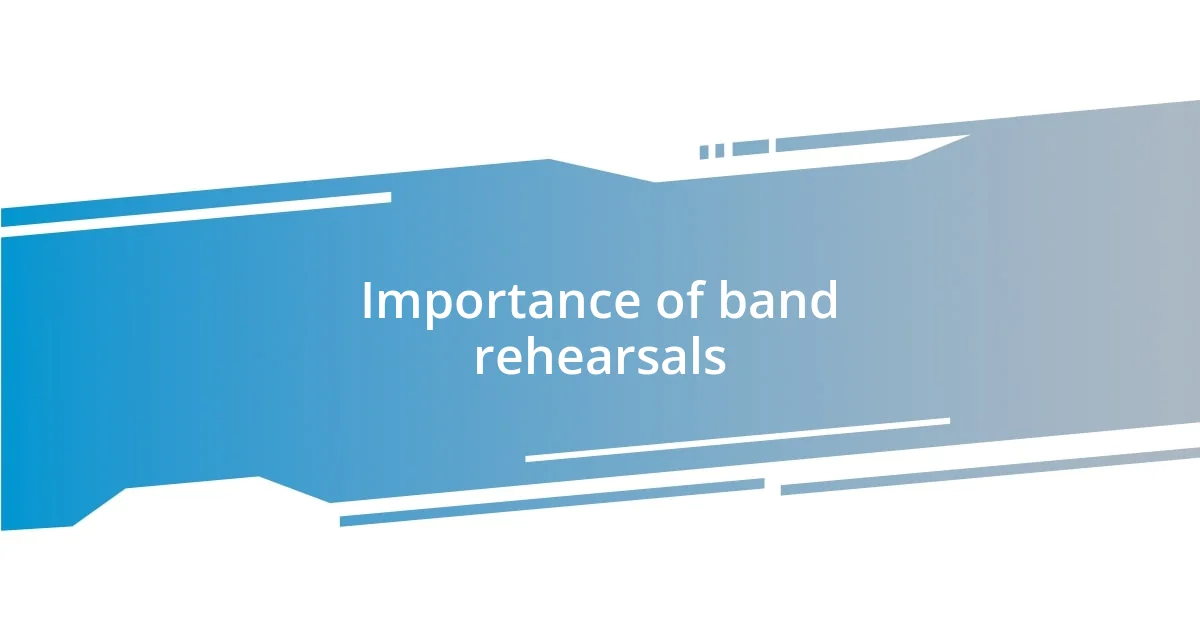
Importance of band rehearsals
Band rehearsals are the backbone of any musical group. I’ve often felt the energy in the room transform when everyone is in sync, creating a palpable sense of camaraderie. Isn’t it incredible how those sessions help build not just musical skills, but also personal connections?
During one of my favorite rehearsals, we struggled to get a challenging piece right. After what felt like an eternity of stumbling, we finally locked in the rhythm together, and the sound was electric. That moment taught me that the hard work in rehearsals pays off in ways we often overlook; it’s about perseverance and unity, not just hitting the right notes.
Have you ever experienced that thrill of finding a groove with your band? For me, rehearsals were more than practice; they were a sanctuary where I learned to communicate through music. This kind of collaboration fosters trust and innovation, allowing us to express our individual voices while creating something uniquely ours.
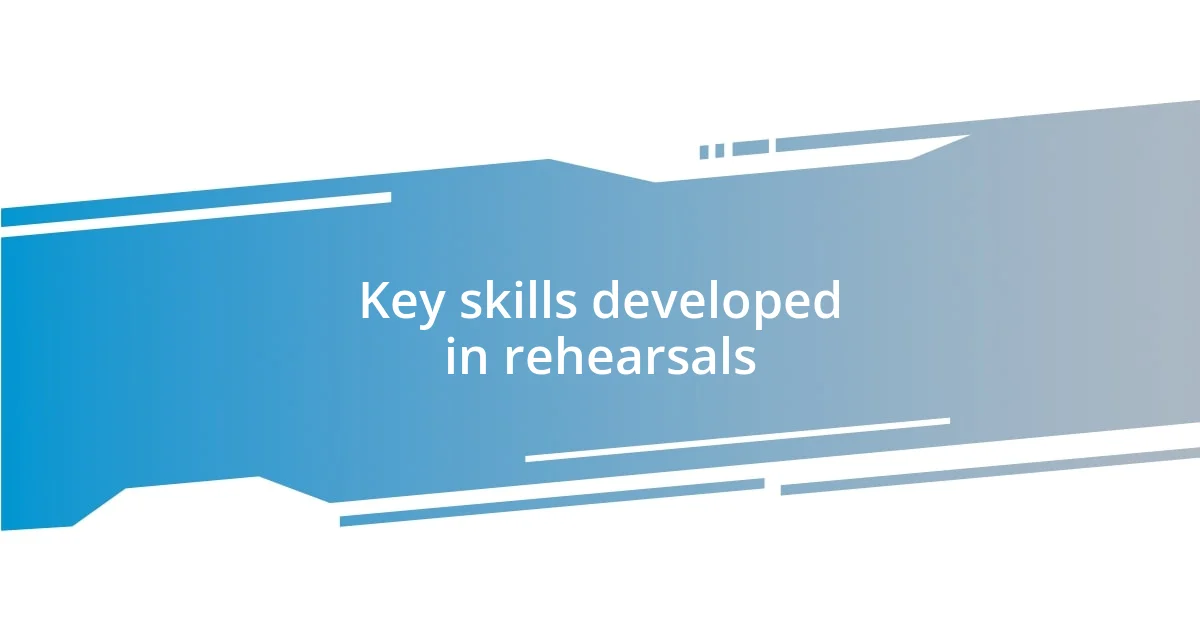
Key skills developed in rehearsals
In rehearsals, I’ve discovered that teamwork is essential. Each member plays a unique role, and I learned how important it is to listen actively. There were times when I thought I could play a piece solo, but I realized that allowing others to shine amplified the overall sound, creating a richer experience for everyone.
Another key skill that develops in rehearsals is adaptability. I remember one session when our lead vocalist fell ill, and we had to switch songs at the last minute. It was a test of our flexibility, and surprisingly, we all rallied together, finding new ways to support each other. That ability to pivot and maintain our rhythm taught me that in music—and life—it’s essential to remain open to change.
Also, the ability to provide and receive constructive feedback stands out as a vital lesson. I recall a round of critiques where we took turns sharing insights about each other’s performances. It wasn’t always easy, but this practice nurtured a culture of growth. Learning to communicate my thoughts while encouraging others has shaped how I engage with both music and my experiences off-stage.
| Skill | Description |
|---|---|
| Teamwork | Learning to listen and collaborate effectively with others. |
| Adaptability | Being flexible to changes and handling unexpected challenges. |
| Constructive Feedback | Providing and receiving insights to enhance individual and group performance. |
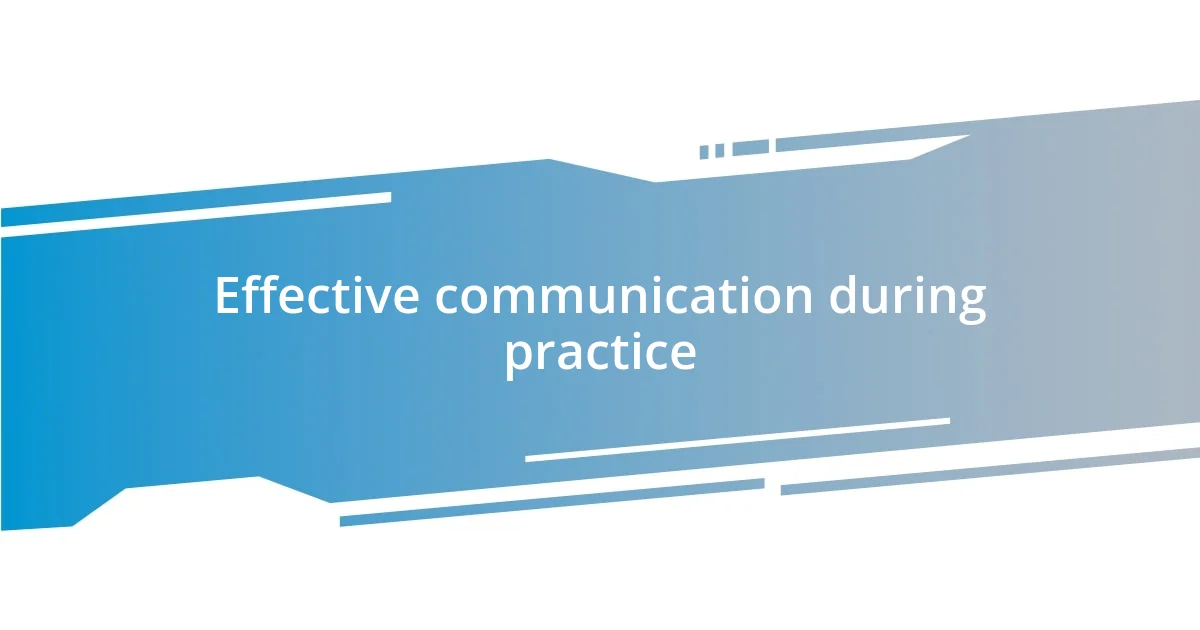
Effective communication during practice
Effective communication during practice is a game-changer. In my experience, the clarity of our discussions dramatically influenced how seamlessly we could play together. I vividly remember a session where one member was feeling overwhelmed by a complex piece, and instead of letting frustration boil over, we took a moment to pause. Sharing our thoughts helped our whole group feel more connected, and we tackled the piece with newfound motivation. I learned that putting feelings on the table—whether it’s excitement or struggle—fosters a supportive atmosphere that ultimately enhances our sound.
- Active Listening: I realized that taking the time to truly hear each other’s ideas can unlock a whole new approach to the music.
- Positivity in Feedback: It’s all about framing critiques positively. I’ve seen how a well-placed compliment can transform someone’s day and, in turn, their performance.
- Check-Ins: Regular emotional check-ins during practice helped us gauge the group’s morale. When everyone feels valued and understood, it’s easier to show up fully engaged.
I can’t stress enough how these moments of vulnerability and sharing not only opened communication avenues but also solidified our bond as a band. These practices turned each rehearsal into a safe space where we could express ourselves freely and push each other to excel.
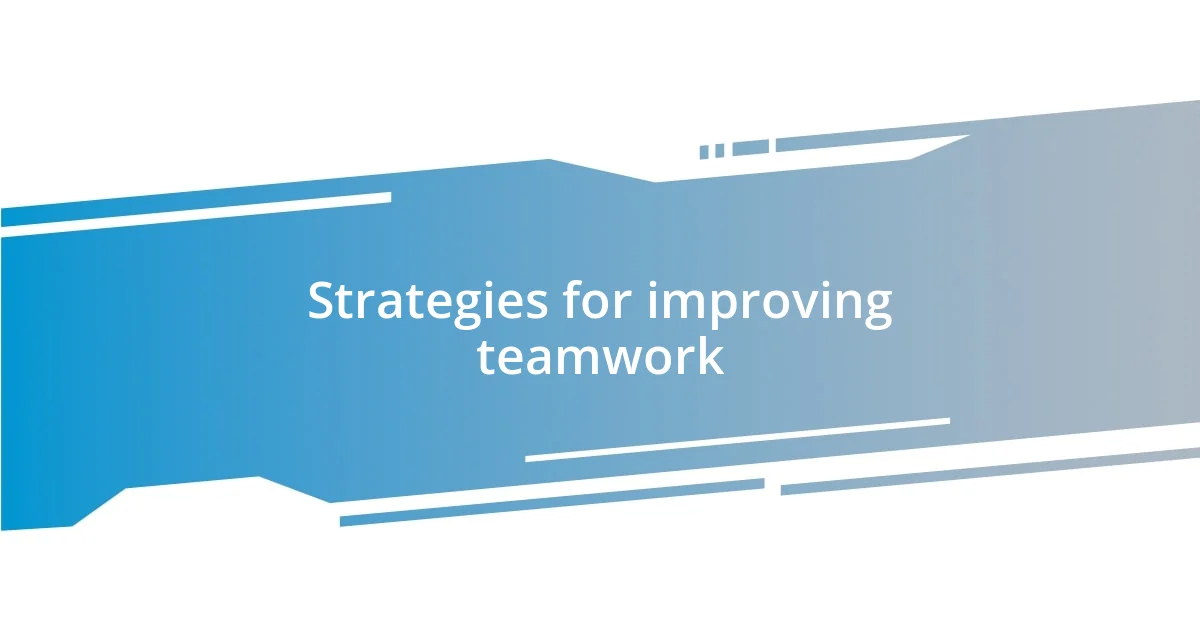
Strategies for improving teamwork
When it comes to improving teamwork in rehearsals, I’ve found that setting clear goals is essential. For instance, during one particularly chaotic rehearsal, we decided to outline our objectives for the day. This clarity helped the whole band focus and align our efforts. I often ask, “What do we want to achieve together?” This simple question opened up conversations that led to greater concerted effort and camaraderie.
Another strategy that has proven powerful is team-building activities outside of practice. I remember when we spent an afternoon cooking together. The laughter and chaos that came from the kitchen transformed our dynamics in rehearsal. It created trust and familiarity that translated into a more cohesive performance. How often do we engage in activities that nurture our relationships? I’ve learned that investing time in each other fosters a sense of belonging, ultimately enhancing our musical collaboration.
Lastly, embracing vulnerability can do wonders for teamwork. I recall an afternoon when I opened up about my nerves before a big performance. Instead of hiding behind bravado, my vulnerability invited others to share their own fears. It’s incredible how sharing these experiences allowed us to support one another in ways I hadn’t expected. Have you ever considered how showing your true self could strengthen your group’s bond? I discovered that it cultivates a rich tapestry of trust, making it easier to navigate challenges together as a team.
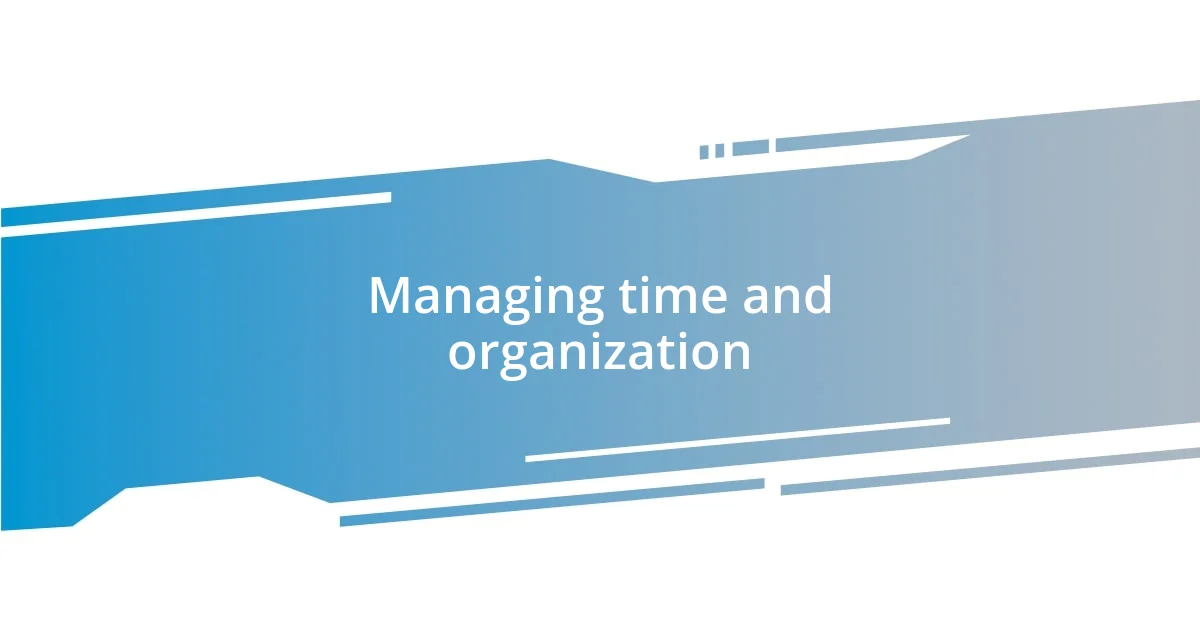
Managing time and organization
Managing time effectively during band rehearsals has become a skill I’ve honed over countless sessions. I recall one rehearsal where we all arrived with no clear agenda, leading to wasted time and frustration. It was a lightbulb moment—I realized that creating a schedule, even a loose one, helps keep everyone focused and accountable. How often do we find ourselves drifting off-topic? This simple act of having a plan transformed our sessions from chaotic to productive.
On the organization front, I’ve learned that having designated roles for each band member is invaluable. Whether it’s someone ticking off our checklist or another person keeping track of time, when everyone knows their responsibilities, it alleviates confusion. There was this one session where I took on the role of timekeeper. By nudging us gently when we were running over, I felt a surge of ownership. It made me ask, “How can our individual contributions elevate the whole?” This sense of organization not only streamlines our time but also reinforces our teamwork.
Lastly, I can’t emphasize enough the importance of a shared calendar for our rehearsals. Early on, we stumbled over scheduling conflicts that left some members out of the loop. By creating a digital space where we all could see rehearsal times, song choices, and even notes from past practices, I witnessed an increase in engagement and commitment. Isn’t it amazing how a simple tool can foster such a stronger connection and reliability within the group? These experiences have taught me that managing time and being organized aren’t just logistical necessities; they’re fundamental to building a strong, cohesive band.
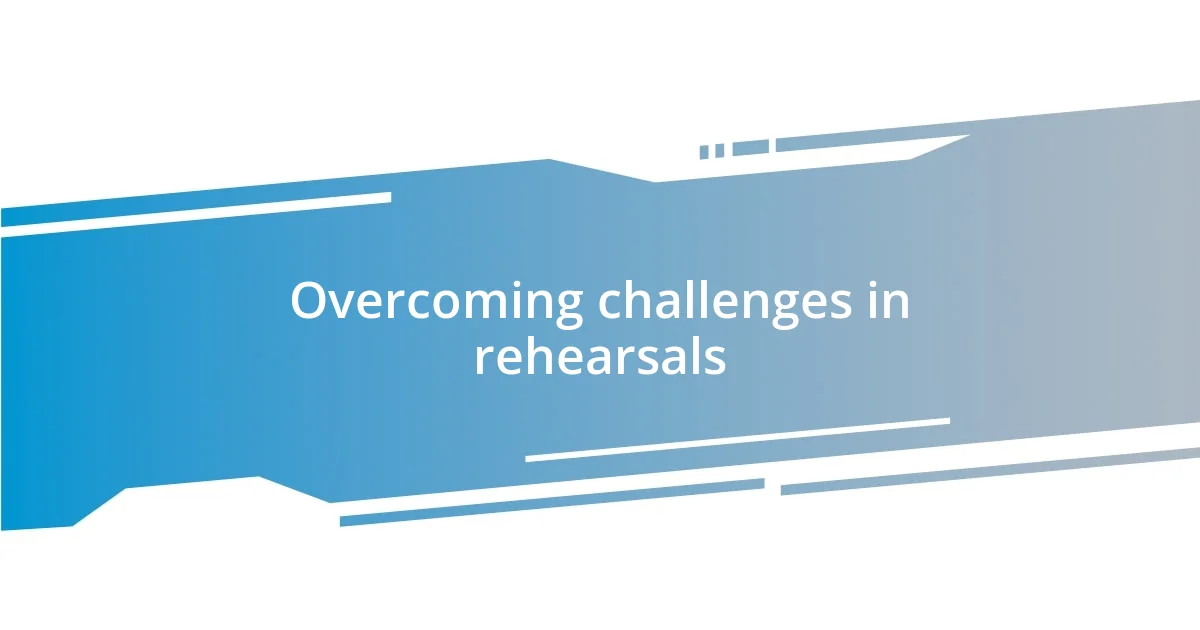
Overcoming challenges in rehearsals
Overcoming challenges during rehearsals often feels like climbing a mountain, but it’s a journey worth taking. I remember a night when our drummer struggled with a new rhythm, and the whole band seemed to hit a wall. Instead of getting frustrated, we took a step back and played a simplified version of the song together. That collective effort not only eased the tension but allowed us to reconnect with the music. Isn’t it fascinating how a little patience can turn a hurdle into a stepping stone?
In another instance, we faced a communication breakdown when we all had different interpretations of a song’s tempo. It was one of those moments that made me realize the importance of open dialogue. I decided to pull everyone aside and share my perspective while encouraging them to voice theirs. It led to a beautiful discussion, transforming confusion into clarity. Have you ever found that just talking it out can unearth creative solutions? I learned that when we create space for each other, we actually carve out opportunities for growth.
Lastly, I can’t underestimate the power of humor in overcoming challenges. During one particularly tense rehearsal where we seemed to play everything wrong, I jokingly declared us the “world’s worst band.” Laughter erupted, and I watched as the atmosphere shifted. By acknowledging our struggles lightheartedly, we reminded ourselves that making music should also be fun. Have you noticed how laughter can dissolve frustration? I truly believe that infusing humor into our rehearsals not only lightens the mood but also strengthens our bonds, turning those challenges into memorable triumphs.
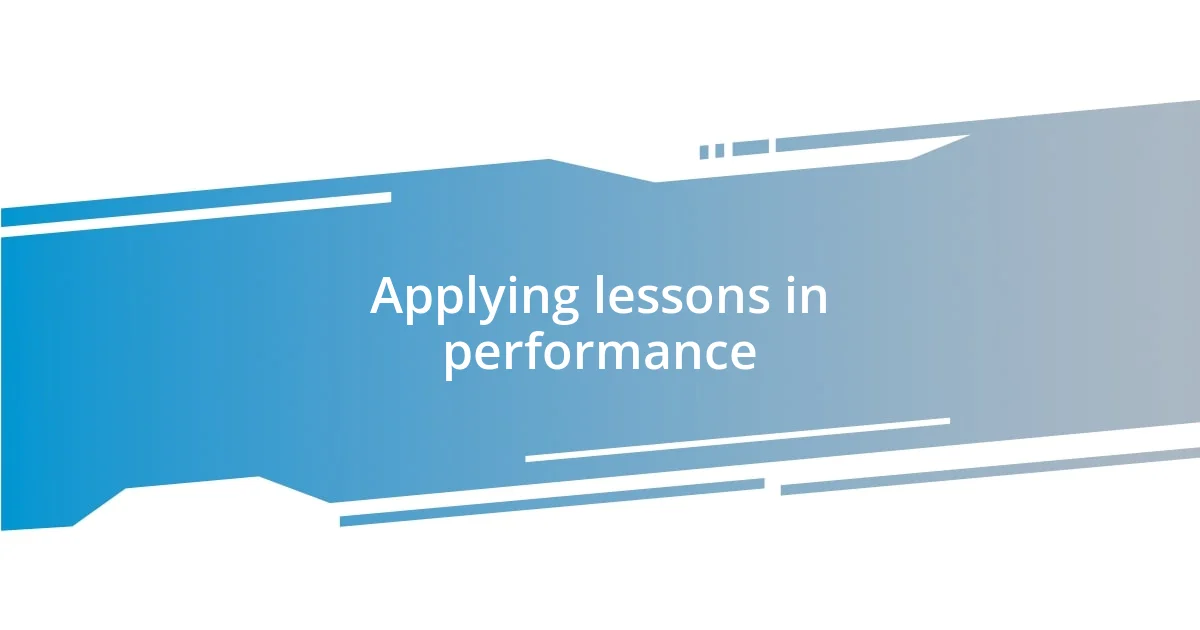
Applying lessons in performance
When it comes to applying what I’ve learned during rehearsals to our performances, it’s all about embracing the lessons of adaptability. I vividly recall a gig where our setlist changed on the fly due to technical issues. Instead of panicking, I leaned into our prior experience of making adjustments in rehearsals. By trusting my bandmates and communicating openly, we navigated through the set seamlessly. Have you ever been in a situation where staying calm made all the difference? I find that the more prepared we are to pivot, the better we can shine under pressure.
Another key lesson is the significance of staging and presence during performances. I remember one show where I felt a bit nervous and disconnected from the audience. Afterward, I reflected on how during rehearsals, we always practiced engaging with each other and the imagined crowd. Now, I make a deliberate effort to incorporate that energy on stage, whether it’s through eye contact or moving around more confidently. This approach not only elevates the performance but also creates a shared experience with the audience. How often do we underestimate the impact of connecting with those we’re performing for?
In terms of emotional expression, I’ve learned how crucial it is to harness the energy of the moment. There was an instance when I closed my eyes during a particularly heartfelt song, letting the lyrics wash over me. The emotion seeped into every note, and I was startled to see the audience resonating with us. That experience taught me that performing isn’t just about hitting the right notes; it’s about sharing a piece of myself. Have you ever felt your performance resonate with an audience on a deeper level? I firmly believe that channeling our rehearsal experiences—both struggles and triumphs—into our performances can create something truly magical.











